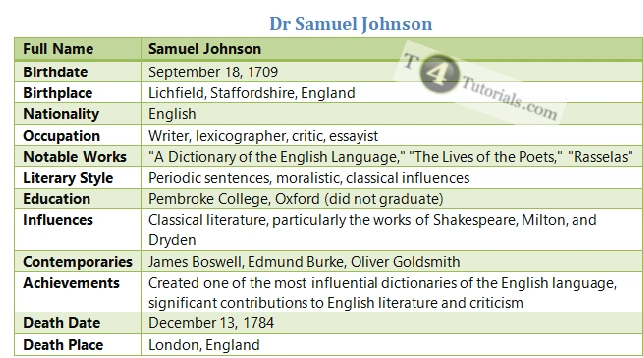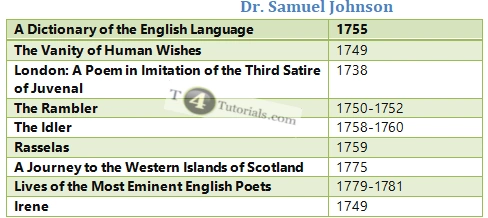19
Score: 0
Attempted: 0/19
Subscribe


Dr. Samuel Johnson books names
| A Dictionary of the English Language | 1755 |
| The Vanity of Human Wishes | 1749 |
| London: A Poem in Imitation of the Third Satire of Juvenal | 1738 |
| The Rambler | 1750-1752 |
| The Idler | 1758-1760 |
| Rasselas | 1759 |
| A Journey to the Western Islands of Scotland | 1775 |
| Lives of the Most Eminent English Poets | 1779-1781 |
| Irene | 1749 |
Dr Samuel Johnson Basic info
| Full Name | Samuel Johnson |
| Birthdate | September 18, 1709 |
| Birthplace | Lichfield, Staffordshire, England |
| Nationality | English |
| Occupation | Writer, lexicographer, critic, essayist |
| Notable Works | “A Dictionary of the English Language,” “The Lives of the Poets,” “Rasselas” |
| Literary Style | Periodic sentences, moralistic, classical influences |
| Education | Pembroke College, Oxford (did not graduate) |
| Influences | Classical literature, particularly the works of Shakespeare, Milton, and Dryden |
| Contemporaries | James Boswell, Edmund Burke, Oliver Goldsmith |
| Achievements | Created one of the most influential dictionaries of the English language, significant contributions to English literature and criticism |
| Death Date | December 13, 1784 |
| Death Place | London, England |
MCQs & Summary of Some Famous Plays by Samuel Johnson
- The Vanity of Human Wishes MCQs & Summary
- On the Death of Dr. Robert Levet MCQs & Summary
- Prologue at the Opening of Drury Lane Theatre MCQs & Summary
- To Miss Hickman Playing on the Spinet MCQs & Summary
Famous English Authors MCQs
- William Wordsworth MCQs
- William Shakespeare MCQs
- Robert Browning MCQs
- W B Yeats MCQs
- Edmund Spenser MCQs
- Chaucer MCQs
- John Milton MCQs
- S T Coleridge MCQs
- Lord Byron MCQs
- PB Shelley MCQs
- John Dryden MCQs
- John Keats MCQs
- Charles Dicken MCQs
- Alfred Lord Tennyson MCQs
- Charles Lamb MCQs
- D.H Lawrence MCQs
- Thomas Hardy MCQs
- Matthew Arnold MCQs
- John Galsworthy MCQs
- George Bernard Shaw MCQs
- T.S Eliot MCQs
- Ben Jonson MCQs
- Francis Bacon MCQs
- Alexander Pope MCQs
- Oliver Goldsmith MCQs
- Joseph Addison MCQs
- Dr Samuel Johnson MCQs
- Henry Fielding MCQs
- Sir Walter Scott MCQs
- Jane Austen MCQs
- Dr. Samuel Johnson MCQs
- English Comedy MCQs (Oliver Goldsmith)
- Alexander Pope MCQs (Neo-Classical Age of English Poetry)
- Daniel Defoe MCQs
- Dr. Jonathan Swift MCQs
- Richard Steele MCQs
- English Drama MCQs
- Elizabethan Drama MCQs [14th to 17th century]
- Elizabethan Prose MCQs
More English Literature MCQs
- English Poetry MCQs
- History of English Literature MCQs
- Sentimental Novels MCQs
- Sentimental Poetry MCQs
- Legends Of English Literature MCQs
- English Literature Quiz
- English Literature Important Multiple Choice Questions Answers
- Sons And Lovers by D H Lawrence MCQs
- The Waste Land, A Poem by T. S. Eliot MCQs
- Drama Origin MCQs
- History of the Renaissance Period MCQs
- English Pros MCQs
- Non-Dramtic Poets Of The Elizabethan Age MCQs
- The Cavalier Poets of 17th-century MCQs
- Metaphysical Poets of 17th century MCQs
- Renaissance Period of 14th, 15th, and 16th centuries MCQs
- Puritan Poet MCQs
- Restoration Comedy by William Congreve & Wycherley MCQs
- Satire MCQs – Renaissance Period by John Dryden
- English Essayists MCQs
- Romantic Period of Romantic Poets MCQs
- English language MCQs
- English Humour MCQs [American Literature]
- Early Writers of American Literature MCQs
- History of American Literature MCQs
- American Prose MCQs [English Realism ]
- American English Critics
- New Englanders Authors MCQs
- MCQs on American Literature After Independence
- American Playwrights MCQs
- New American Poetry MCQs
- British English Critics MCQs
- Ancient English literature MCQs
- Important English Literature MCQs for Public Service Commission
- English Literature Repeated Important MCQs
- CSS English Literature MCQs
- History of Early Period MCQs
- The Anglo-Saxon period MCQs
- The Age of Chaucer in the Early Period MCQs
- The Anglo-Norman Period of French Writers MCQs
- Metrical Romances MCQ (Anglo-Saxon Period)
- Revival of Learning MCQs (1400-1550)
- Applied Linguistics MCQs
- Language Change MCQs